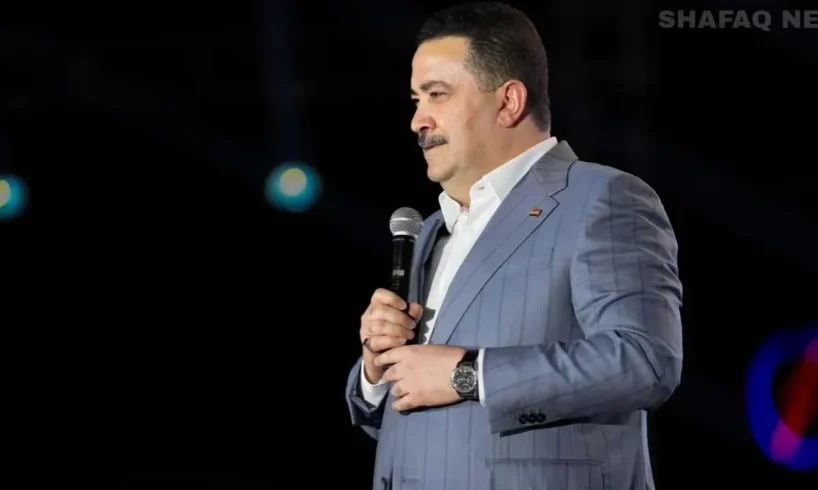
Shafaq News
Iraq’s 2025
parliamentary elections have reshaped the country’s political map without
producing a clear and decisive winner. Prime Minister Mohammed Shia Al-Sudani’s
Reconstruction and Development Coalition (Al-Ima’ar Wal Tanmiya) emerged as the
largest bloc. Yet, it fell short of the seats required to govern alone, leaving
Baghdad’s political path uncertain.
Despite Al-Sudani’s
rise as a central figure in Iraq’s Shiite politics, the absence of the
Patriotic Shiite Movement (PSM) led by Muqtada al-Sadr, the emergence of rival
Shiite lists, and the resurgence of assertive Sunni and Kurdish blocs have
added layers of complexity to the post-election landscape.
The nation now faces
a choice between a second term for Al-Sudani or a power-sharing coalition
crafted through delicate negotiations among long-time rivals.
Read more: Iraq’s post-election roadmap: From ballot to government formation
A divided Mandate
Turnout in the
recently held parliamentary elections exceeded 56%, according to the
Independent High Electoral Commission (IHEC), surpassing expectations. Results
showed Al-Sudani’s Coalition securing 1,317,346 votes across 12 of Iraq’s 18
provinces, ahead of the Taqaddum Party led by former parliament speaker
Mohammed al-Halbousi and the State of Law Coalition (E’tilaf Dawlatal-Qanoun)
headed by former Prime Minister Nouri Al-Maliki.
Within the broader
Coordination Framework (CF) — the predominantly Shiite alliance currently
steering Baghdad’s government — Al-Sudani’s bloc won almost 45 seats. It was
followed by Al-Maliki’s State of Law with 30, Sadiqoon led by Qais Al-Khazali
with 26, Badr Organization headed by Hadi Al-Amiri with 19, and the National
State Forces Alliance (Tahaluf Quwa al-Dawla al-Wataniyah) under Ammar Al-Hakim
with 18. Together, these factions hold around 126 seats, giving the framework
the largest share within the Shiite camp.
For Ahmad Al-Yasiri,
director of the Australian-Arab Center for Strategic Studies, the high turnout
signals “a collective desire to avoid chaos and preserve stability” rather than
a surge in political engagement.
“The voters didn’t
rally behind a single bloc capable of securing a majority,” Al-Yasiri explained
to Shafaq News, adding that “Everyone now needs to negotiate alliances.”
He further observed
that while public awareness has increased, it has not yet translated into
support for emerging political forces, leaving traditional blocs firmly
entrenched.
Regional tensions
have also shaped voter behavior. With rising friction between Iran and Israel,
Al-Yasiri suggested that Iraqis opted for predictability over risk. “People
chose stability rather than gambling on change,” he remarked, adding that
established blocs are likely to steer the next stage until regional and
international dynamics become clearer.
Pointing out that
factions with armed wings could complicate political negotiations if excluded
from power, he urged their partial inclusion to prevent confrontation or
regional entanglements.
Political blocs must
act carefully,” he concluded, “as both Washington and Tehran continue to shape
decision-making in Baghdad.”
Read more: Iraq’s 2025 Elections: Old lines, new margins
The coalition Puzzle
Dr. Haitham Al-Hiti,
professor of political science at the University of Exeter, described the
outcome as fragmented and inconclusive. Despite topping the results,
Al-Sudani’s bloc captured far fewer seats than anticipated—just 45 instead of
the projected 70 to 100.
“This isn’t a
sweeping victory; it’s a fractured parliament,” Al-Hiti observed. “Dozens of
small parties will make coalition-building an uphill task.”
He further explained
that Al-Sudani, though leading the vote count, will need to work with multiple
small and ideologically diverse groups. “The real test is whether these forces
can align around a coherent vision capable of producing a strong and durable
government,” he added.
Framework Decides
Within the CF,
discussions are already underway to determine the next steps. Fahd al-Jubouri,
a senior figure in the National Wisdom Movement led by Ammar Al-Hakim, noted
that the bloc has not yet decided on the next prime minister, ruling out any
potential candidates.
“The framework can
comfortably choose the next prime minister,” Al-Jubouri emphasized, indicating
that renewing Al-Sudani’s term remains a possibility. However, a committee
within the framework is expected to meet in the coming days to define the
standards for the role, as well as balancing professional qualifications with
political and regional considerations.
Acknowledging the
different views regarding Al-Sudani’s current term, Al-Jubouri cautioned that
those discussions will come later as negotiations evolve.
Meanwhile, Mukhtar
Al-Moussawi, a senior member of the Badr Organization, emphasized that the CF
will announce its “largest parliamentary grouping” once the results are
certified, noting that the framework’s lists have enough seats to nominate the
next prime minister, though not necessarily in alignment with Al-Sudani’s
coalition.
Read more: Iraq’s 2025 Elections: Voter turnout formula sparks controversy
New PM Calculus
On Wednesday, a
political source informed Shafaq News that leaders of the Coordination
Framework have already begun outlining early plans for government formation.
In a meeting held
immediately after the announcement of the election results, the leaders
established the general principles for managing the political process,
emphasizing adherence to constitutional deadlines as well as the swift
completion of cabinet formation.
As part of these
discussions, they reaffirmed their commitment to the Coordination Framework,
noting that the selection of the prime minister will depend not only on the
number of seats held but also on professional credibility and regional and
international acceptance.
The source did not
rule out a second term for Al-Sudani, adding that it would proceed “unless a
key faction objects,” a remark widely interpreted as referring to former Prime
Minister Nouri Al-Maliki.
“Most framework
leaders attended the meeting, except for the current prime minister,” the
source noted, highlighting that the talks also included outreach to boycotting
groups—particularly the Patriotic Shiite Movement led by Muqtada Al-Sadr—to
gauge their position on a potential second term for Al-Sudani.
Written and edited by
Shafaq News staff.





